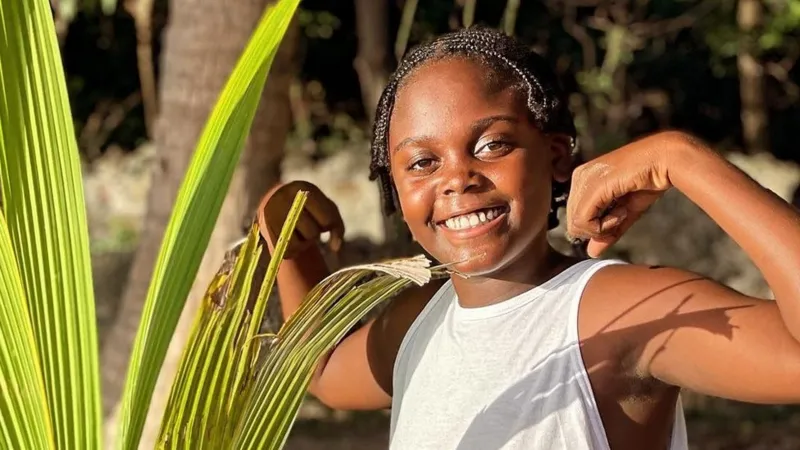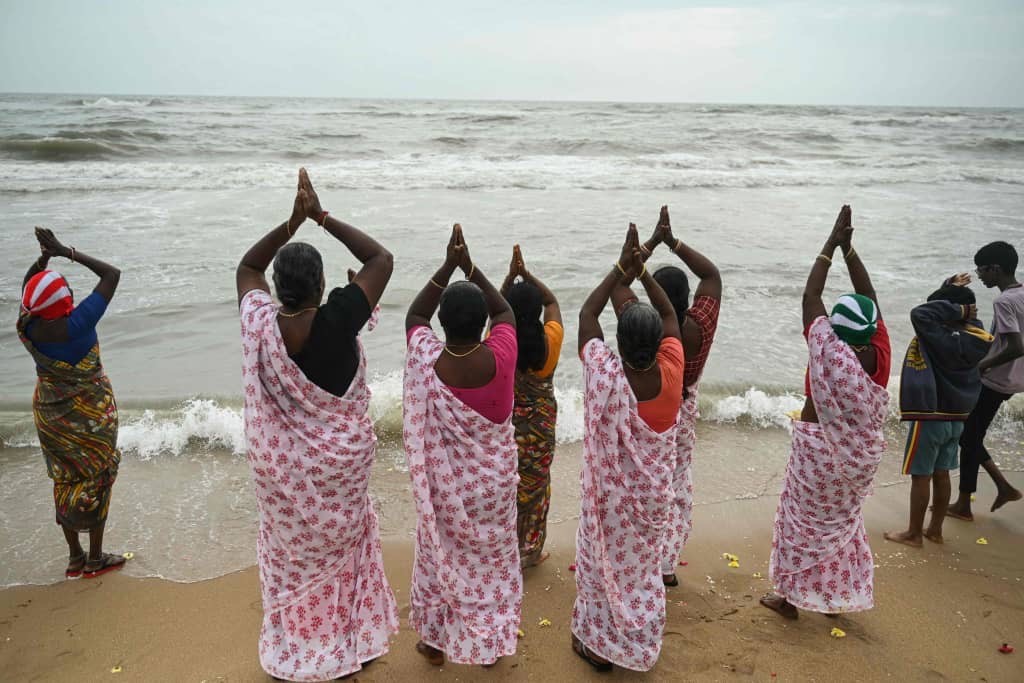Kih’Nyiah McKay may be just 11 years old, but she is keenly aware of the climate crisis.
She knows the loss of trees reduces oxygen and that dumped garbage kills the sea turtles that keep the ocean around her healthy.
“Young people need to save the Earth,” she says with a solemnity that belies her age.
It is only March, but the sun outside is already blisteringly hot, posing a challenge for the electric fans battling valiantly to keep Kih’Nyiah’s classroom cool.
In Antigua, like the rest of the Caribbean, the impacts of climate change are a daily reality, evidenced in receding beaches, worsening hurricanes, debilitating droughts and increasingly suffocating summers.
Some islanders, however, are fighting back.
Kih’Nyiah is one of more than 60 girls and young women who have been trained as coastal stewards, tasked with planting indigenous trees to slow coastal erosion, protecting the nesting sites of critically endangered turtles, and making and managing beach bins.
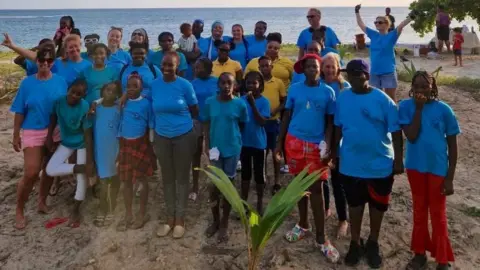 Dozens have already been trained as coastal stewards
Dozens have already been trained as coastal stewards
The project created by local NGO Adopt-a-Coastline has been so successful, it was selected for a $100,000 (£80,000) grant from the United Nations’ Global Environment Facility (GEF) last August, one of just 23 ventures chosen from 600 applications.
The funding will enable it to roll out to three other small Caribbean islands – Antigua’s sister Barbuda, plus Nevis and Carriacou – later this year.
A key part of the work is encouraging women and girls to “have more of a voice”, explains Adopt-a-Coastline’s executive director Kat Byles.
Traditional gender roles are still deeply ingrained in much of the Caribbean and the project aims to instil new skills, such as collating and analysing eco data, into the next generation of women and inspire them into taking leadership roles.
Kih’Nyiah’s school principal, Ryona Shaw-Joseph, was delighted to get involved by rounding up a clutch of kids to take part and pitching in with a beach clean-up.
“We need to teach children to take care of what we have, so it can be sustained for the future,” she says.
“And it’s important to show the girls a different path; not everyone can just go and work for the government,” she adds, in reference to the country’s bloated public sector.
Kaiesha Joseph is one who needs little convincing.
At 24, the youth parliamentarian dreams not of working for the government, but running it, by one day becoming the country’s first female prime minister.
For now, though, she has her sights set on taking her younger peers along for the ride by supporting Adopt-a-Coastline’s endeavours.
“We have developed a culture in Antigua and Barbuda where certain roles are for men, and many women still gravitate towards nurturing jobs like midwives, teachers and secretaries,” she tells the BBC.
“They would rather assist from the back and let the men step forward.”
Pensioners Beach on Antigua’s west coast is one of several adopted under the programme to be cleaned and cared for by community volunteers.
Kaiesha points out the bins the team have crafted from discarded tyres, otherwise destined for the landfill site which smokes silently in the distance.
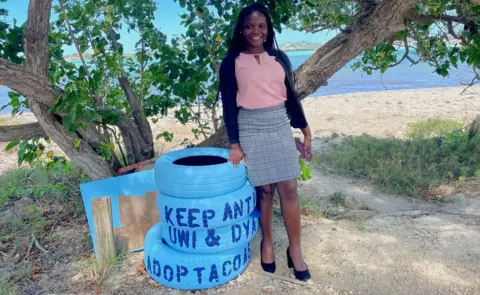 Kaiesha Joseph wants women to blaze a trail
Kaiesha Joseph wants women to blaze a trail
Here, the alabaster-white sands are fringed by seagrape trees, creating a picture-postcard tableau that enthrals the tourists who flock to this sun-drenched island each year.
But the regular influx of visitors also means an incessant amount of waste, which must be tackled by the tiny nation with its meagre resources. Today alone, four gargantuan cruise ships can be seen at the capital city’s port.
This May, several thousand more visitors, including dozens of world leaders, are due to arrive when Antigua stages the UN’s fourth small island developing states conference. The event aims to assess the ability of small islands like this one, which suffer the worst effects of climate change, to develop sustainably and agree a path forward.
Input from young women such as Kaiesha will be vital. “We may be a small country,” she says, “but we need to make our voices heard.”
Carolyn Perry, from the government’s youth affairs department, says that while more females are now exploring tertiary education, they still struggle to attain upper management jobs.
“If we empower them from a young age, we will see our communities transformed,” she says.
Adopt-a-Coastline is also helping girls earn a modest income by teaching them how to craft jewellery, bird boxes and benches from marine debris for sale in the charity’s shop.
The NGO was founded in 2009 by long-term resident Jennifer Meranto.
“I added up all the trash I’d contributed to Antigua over the last 20 years. People have a misconception that if they throw something away, it goes away. But it doesn’t; much of it ends up in the ocean. I decided I wanted to erase my own footprint,” she explains.
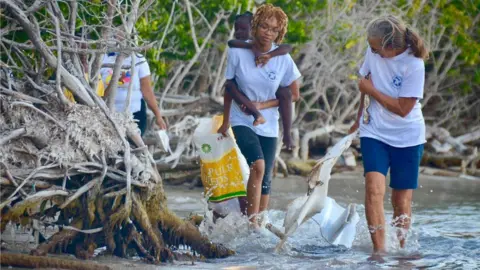 Jennifer Meranto (right) has been clearing the nation’s beaches of rubbish for many years
Jennifer Meranto (right) has been clearing the nation’s beaches of rubbish for many years
Jennifer began by removing 1,000 bags of litter from the island’s beaches.
Others began to join her and the organisation expanded organically.
For Kat, a crucial aspect of the project is the feeling of wellness derived from being by the ocean. She is looking forward to expanding the work across the region. The ideas and experiences the children get, she says, will be taken into adulthood and widen the opportunities open to them.
Kaiesha agrees. “Right now, it’s mainly men in the decision-making roles,” she adds. “We need women too. I want to encourage them to take up as much space as they can, stand up for what they believe in and speak out.”
Stay informed with The Namibian – your source for credible journalism. Get in-depth reporting and opinions for
only N$85 a month. Invest in journalism, invest in democracy –
Subscribe Now!



